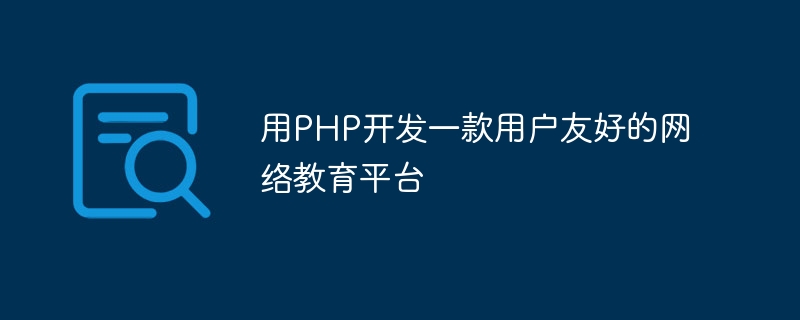

With the rapid development of the Internet, online education has become an important way for people to acquire knowledge and improve their self-abilities. In order to meet people's needs for online learning, more and more educational institutions and companies have begun to develop their own online education platforms. In this process, it has become a trend to use PHP to develop a user-friendly online education platform.
Why choose PHP as a development language? First of all, PHP is a mature, stable, and versatile server scripting language with extensive community support and rich documentation resources, so developers can more easily develop and maintain educational platforms. Secondly, PHP has cross-platform features and can run on multiple operating systems such as Windows, Linux and Mac, and can meet the needs of users on different platforms. Finally, PHP also provides many open source frameworks and tools that can speed up the development process and improve development efficiency.
When developing a user-friendly online education platform, the following aspects need to be considered.
First of all, the user interface of the platform needs to be simple and clear. The user-friendly interface can improve the user experience and reduce the difficulty of learning. Users should be able to easily find the course resources they need and clearly understand the course content and learning progress. At the same time, functions such as exercises, assignments, and exams need to be provided to facilitate students’ self-assessment and testing.
Secondly, the course management function of the platform needs to be improved. Education platforms should be able to support teachers in uploading, managing and publishing course content. Teachers can freely organize and arrange courses according to their own teaching plans and teaching goals. In addition, the platform should also provide student management functions to facilitate teachers to evaluate students' performance and track their learning.
Third, the platform needs to have good interactivity. Learning is a process of communication and interaction. Education platforms should provide real-time online discussion and question and answer functions to facilitate interactive communication between students and teachers. In addition, the platform can also provide online live broadcast and recording functions, making it convenient for students to participate in courses anytime and anywhere, and providing a more flexible learning method.
Fourth, the platform needs to have personalized recommendation functions. Different students have different learning needs and habits. The platform can personally recommend relevant courses and learning resources based on students' interests, hobbies and learning history, and provide more accurate learning content.
Finally, the platform needs to have stable and reliable performance. The online education platform may be accessed by a large number of users at the same time, so the platform needs to have good scalability and load balancing capabilities to ensure user access speed and stability.
To sum up, it is very necessary to use PHP to develop a user-friendly online education platform. Through carefully designed user interfaces, complete course management functions, good interactivity, personalized recommendations and stable and reliable performance, we can help educational institutions and enterprises create an online learning platform that meets user needs and provide a better learning experience. and learning effects.
The above is the detailed content of Develop a user-friendly online education platform using PHP. For more information, please follow other related articles on the PHP Chinese website!




